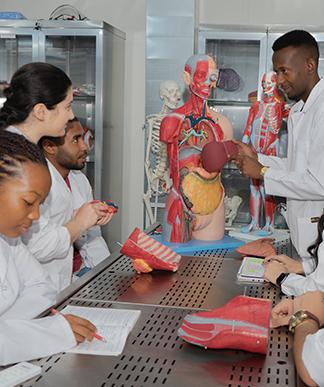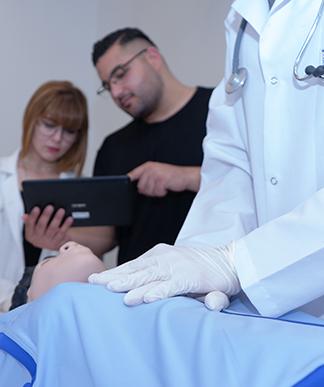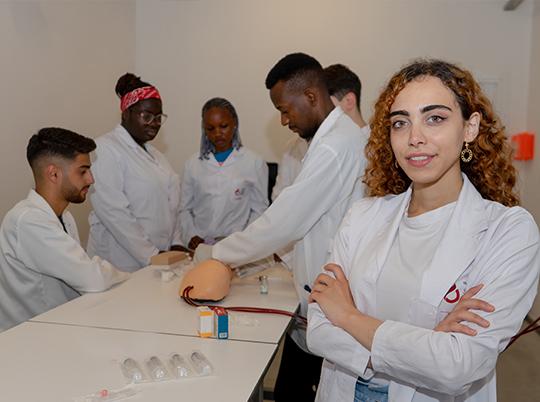


About the Program
The Faculty of Medicine was established to bring a new and different perspective to medical education. The aim is to become a training and health institution with universal standards, aiming to do research, provide education from elected faculty members, and to serve tomorrow's leaders in the field of medicine. The education period is six years, and the medium of instruction is English. During the first three years, in addition to theoretical and laboratory courses in basic sciences and clinical medicine, there are introductory courses in clinical practice with clinical practices component. The program consists of medical training internships in the fourth and the fifth years. In the sixth year, students will take the responsibility of patient care, and complete their education under the supervision of the teaching practitioners.
Click here for the curriculum of the Faculty of Medicine.
Educational Opportunities
The faculty is equipped with the most advanced technology needed for education and research in classrooms and laboratories, with the aim of providing the best and highest quality of education. Students will find all kinds of research and study opportunities in molecular medicine, biochemistry, neurological sciences, cell culture, microbiology, neurophysiology, and homodynamic laboratories. In addition to a comprehensive model laboratory designed for anatomy training, there is an advanced cadaver room. Physiology education will be offered with computerized data, recording and experimentation systems, and each student will be presented with separate microscope and training sets. Also, the program allows each student to participate actively in experiments; biochemical and molecular analysis, metabolism analysis, and structural and biochemical analysis of micro-organisms, in a separate training laboratory.

Career Areas
Students graduating from the Faculty of Medicine, will have the opportunity to work as general medical practitioners in public and private health institutions. Graduates can also apply to "Ph.D." programs in the Department of Basic Medical Sciences of other universities to become academics.
General practitioners wishing to receive special education can continue their specialist education in any field of education at research hospitals or university hospitals, by taking relevant exams to get the title of "Specialist Doctor". Medical doctors can work at private or public health institutions in any country in the world or at their own clinics.
Contact
Faculty of Medicine
Central Lecture Halls, CL213
Tel: +90 392 671 1111 Extension: 2551
Faculty E-mail: secretary-fm@ciu.edu.tr
Dean: Prof. Dr. Hikmet Ayşegül TAYLAN ÖZKAN
Dean E-mail: ataylan@ciu.edu.tr
Compulsory Courses
First Year
ACADEMIC READING AND WRITING SKILLS-I
Course code
ENGL145Credit
0Theoretical
2Practical
0Ects
2INTRODUCTION TO INFORMATION TECHNOLOGY
Course code
ITEC120Credit
0Theoretical
3Practical
0Ects
2ELECTIVE-I
Course code
MDCN100Credit
0Theoretical
2Practical
0Ects
2PHYSICAL, CHEMICAL AND MOLECULAR BASIS OF LIFE
Course code
MDCN101Credit
0Theoretical
10Practical
0Ects
9CELLULAR METABOLISM
Course code
MDCN102Credit
0Theoretical
10Practical
0Ects
9INHERITANCE AND TISSUE
Course code
MDCN103Credit
0Theoretical
8Practical
0Ects
9MOVEMENT SYSTEMS
Course code
MDCN104Credit
0Theoretical
8Practical
0Ects
9PUBLIC HEALTH AND SOCIAL MEDICINE
Course code
MDCN105Credit
0Theoretical
10Practical
0Ects
5STUDY MODULES I
Course code
MDCN107Credit
0Theoretical
4Practical
4Ects
2EARLY OBSERVATION OF CLINICS
Course code
MDCN149Credit
0Theoretical
4Practical
0Ects
4INTRODUCTION TO UNIVERSITY LIFE
Course code
ORYN100Credit
0Theoretical
0Practical
0Ects
1TURKISH LANGUAGE
Course code
TREG120Credit
0Theoretical
2Practical
0Ects
2TURKISH LANGUAGE EDUCATION-I
Course code
TURK111Credit
0Theoretical
2Practical
3Ects
2ACADEMIC READING AND WRITING SKILLS-II
Course code
ENGL146Credit
0Theoretical
2Practical
0Ects
2TURKISH-II
Course code
TREG134Credit
0Theoretical
2Practical
0Ects
2TURKISH LANGUAGE EDUCATION-II
Course code
TURK112Credit
0Theoretical
2Practical
3Ects
2Second Year
Foreign Language Elective
Course code
FLEXX1Credit
0Theoretical
2Practical
0Ects
2HISTORY OF CIVILIZATION-I
Course code
HIST121Credit
0Theoretical
2Practical
0Ects
2NERVOUS SYSTEM
Course code
MDCN201Credit
0Theoretical
12Practical
0Ects
10BLOOD AND THE LYMPHATIC SYSTEM
Course code
MDCN202Credit
0Theoretical
4Practical
0Ects
5CARDIOVASCULAR AND RESPIRATORY SYSTEMS
Course code
MDCN203Credit
0Theoretical
9Practical
0Ects
8GASTROINTESTINAL SYSTEM
Course code
MDCN204Credit
0Theoretical
12Practical
0Ects
10UROGENITAL SYSTEM
Course code
MDCN205Credit
0Theoretical
5Practical
0Ects
4BASIS OF DISEASES
Course code
MDCN206Credit
0Theoretical
13Practical
0Ects
10STUDY MODULES II
Course code
MDCN207Credit
0Theoretical
3Practical
0Ects
3EARLY OBSERVATION OF CLINICS
Course code
MDCN249Credit
0Theoretical
4Practical
0Ects
2ATATURK PRINCIPLES AND HISTORY OF TURKISH REFORMS-I
Course code
TARH121Credit
0Theoretical
2Practical
0Ects
2TURKISH LANGUAGE EDUCATION-II
Course code
TURK211Credit
0Theoretical
2Practical
3Ects
2Foreign Language Elective
Course code
FLEXX2Credit
0Theoretical
2Practical
0Ects
2HISTORY OF CIVILIZATION-II
Course code
HIST122Credit
0Theoretical
2Practical
0Ects
2ATATURK PRINCIPLES AND HISTORY OF TURKISH REFORMS-II
Course code
TARH122Credit
0Theoretical
2Practical
0Ects
2TURKISH LANGUAGE EDUCATION-IV
Course code
TURK212Credit
0Theoretical
2Practical
3Ects
2Third Year
Foreign Language Elective
Course code
FLEXX3Credit
0Theoretical
2Practical
0Ects
2ELECTIVE-II
Course code
MDCN300Credit
0Theoretical
2Practical
0Ects
2DERMATOLOGY AND MUSCOLO-SKELETAL SYSTEMS
Course code
MDCN301Credit
0Theoretical
7Practical
0Ects
7SENSORY-NEURAL SYSTEM
Course code
MDCN302Credit
0Theoretical
11Practical
0Ects
9CARDIORESPIRATORY SYSTEM
Course code
MDCN303Credit
0Theoretical
11Practical
0Ects
10METABOLISM AND DIGESTIVE SYSTEM
Course code
MDCN304Credit
0Theoretical
10Practical
0Ects
9UROGENITAL SYSTEM
Course code
MDCN305Credit
0Theoretical
7Practical
0Ects
7HEMATOPOIETIC SYSTEM AND MULTISYSTEM DISORDERS
Course code
MDCN306Credit
0Theoretical
7Practical
0Ects
5STUDY MODULES III
Course code
MDCN307Credit
0Theoretical
1Practical
0Ects
3OCCUPATIONAL SKILLS
Course code
MDCN308Credit
0Theoretical
2Practical
0Ects
4TURKISH LANGUAGE EDUCATION-V
Course code
TURK311Credit
0Theoretical
0Practical
3Ects
2Foreign Language Elective
Course code
FLEXX4Credit
0Theoretical
2Practical
0Ects
2TURKISH LANGUAGE EDUCATION-VI
Course code
TURK312Credit
0Theoretical
2Practical
3Ects
2Fourth Year
INTRODUCTION TO CLINICAL SCIENCES
Course code
MDCN401Credit
0Theoretical
0Practical
0Ects
PAEDIATRICS
Course code
MDCN402Credit
0Theoretical
0Practical
0Ects
NEUROLOGY
Course code
MDCN403Credit
0Theoretical
0Practical
0Ects
PSYCHIATRY
Course code
MDCN404Credit
0Theoretical
0Practical
0Ects
INFECTIOUS DISEASES
Course code
MDCN405Credit
0Theoretical
0Practical
0Ects
DERMATOLOGY
Course code
MDCN406Credit
0Theoretical
0Practical
0Ects
PHYSICAL MEDICINE AND REHABILITATION
Course code
MDCN407Credit
0Theoretical
0Practical
0Ects
CARDIOLOGY
Course code
MDCN408Credit
0Theoretical
0Practical
0Ects
INTERNAL MEDICINE
Course code
MDCN409Credit
0Theoretical
0Practical
0Ects
PULMANORY DISEASES
Course code
MDCN410Credit
0Theoretical
0Practical
0Ects
Fifth Year
MEDICAL ETHICS
Course code
MDCN501Credit
0Theoretical
0Practical
0Ects
ANESTHESIOLOGY AND REANIMATION
Course code
MDCN502Credit
0Theoretical
0Practical
0Ects
OTORHINOLARYNGOLOGY
Course code
MDCN503Credit
0Theoretical
0Practical
0Ects
FORENSIC MEDICINE
Course code
MDCN504Credit
0Theoretical
0Practical
0Ects
GENERAL SURGERY
Course code
MDCN505Credit
0Theoretical
0Practical
0Ects
OBSTETRICS AND GYNECOLOGY
Course code
MDCN506Credit
0Theoretical
0Practical
0Ects
OPHTHALMOLOGY
Course code
MDCN507Credit
0Theoretical
0Practical
0Ects
PAEDIATRIC SURGERY
Course code
MDCN508Credit
0Theoretical
0Practical
0Ects
PLASTIC, RECONSTRUCTIVE AND AESTHETIC SURGERY
Course code
MDCN509Credit
0Theoretical
0Practical
0Ects
UROLOGY
Course code
MDCN510Credit
0Theoretical
0Practical
0Ects
AREA ELECTIVE
Course code
MDCN5X1Credit
0Theoretical
0Practical
0Ects
AREA ELECTIVE
Course code
MDCN5X2Credit
0Theoretical
0Practical
0Ects
Sixth Year
EMERGENCY MEDICINE INTERNSHIP
Course code
MDCN601Credit
0Theoretical
0Practical
0Ects
FAMILY MEDICINE INTERNSHIP
Course code
MDCN602Credit
0Theoretical
0Practical
0Ects
GENERAL SURGERY INTERNSHIP
Course code
MDCN603Credit
0Theoretical
0Practical
0Ects
INTERNAL MEDICINE INTERNSHIP
Course code
MDCN604Credit
0Theoretical
0Practical
0Ects
GYNECOLOGY AND OBSTETRICS INTERNSHIP
Course code
MDCN605Credit
0Theoretical
0Practical
0Ects
PAEDIATRY INTERNSHIP
Course code
MDCN606Credit
0Theoretical
0Practical
0Ects
PSYCHIATRY INTERNSHIP
Course code
MDCN607Credit
0Theoretical
0Practical
0Ects
PUBLIC HEALTH INTERNSHIP
Course code
MDCN608Credit
0Theoretical
0Practical
0Ects
INTENSIVE CARE INTERNSHIP
Course code
MDCN609Credit
0Theoretical
0Practical
0Ects
ELECTIVE
Course code
MDCN6X1Credit
0Theoretical
0Practical
0Ects
Elective Courses
INHERITED METABOLIC DISORDERS
Course code
MDCN003Credit
0Theoretical
2Practical
0Ects
2COMPERATIVE MEDICAL TERMINOLOGY
Course code
MDCN004Credit
0Theoretical
2Practical
0Ects
2NUTRITION AND MICROBIOTA
Course code
MDCN002Credit
0Theoretical
2Practical
0Ects
2APPLICATIONS OF COMPUTERS IN MEDICINE
Course code
MDCN001Credit
0Theoretical
2Practical
0Ects
2TRNC citizens and TR citizen candidate students who have completed their entire high school education in TRNC. They are placed in undergraduate programs in line with their success in the CIU Student Placement and Scholarship Ranking Exam and the programs they prefer.
Students who are successful in the exam can register from the TRNC Marketing Office.
Applicants can directly apply online to our undergraduate programs by using the application portal. Please fill in your details correctly and upload all the required documents listed on the last page of the application form.
Required documents;
- Completed application form,
- Higher/Secondary Certificate or equivalents (e.g. O/A’Level, WAEC/NECO)
- Evidence of English Language competence: TOEFL (65 IBT) or IELTS (5.5). Students without these documents will take the CIU English proficiency exam on campus following arrival,
- Scanned copy of international passport/birth certificate,
- Fully completed and signed CIU Rules and Regulations document (which can be downloaded during the online application).
Cyprus International University provides academic scholarships for its students as an incentive for success, with most students benefiting from 50%, 75% or 100% scholarships or discounted tuition fees. Click for more information.
Tuition Fees are determined at the beginning of each academic year. Candidate students who are entitled to enroll in CIU can learn their fees in line with the Tuition Fee Calculation system.